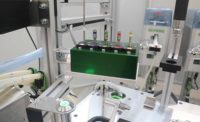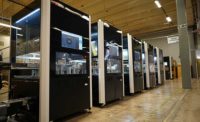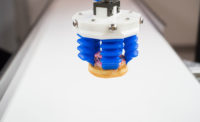New employees are hard to find in Bocholt, Germany, a city of 71,000 people a few kilometers from the Dutch border.
Bocholt is a manufacturing town. For most of the 19th and 20th centuries, it was centered on the textile industry. Today, there are still several successful textile manufacturers in town, but most of Bocholt’s manufacturers now focus on mechanical assemblies. Competition for skilled workers is fierce.
One manufacturer competing for workers is Rose Bikes GmbH, a customer-focused company with a mission to provide riders with unique biking adventures. The 480-strong family business specializes in high-performance bikes. The company’s products range from simple mountain bikes for just under 800 euros to high-end road bikes with carbon frames costing more than 8,000 euros. The company produces some 120 bike models, which can weigh 5 to 28 kilograms. In 2021, the company tallied 148.7 million euros in sales.
Because of its continuing growth, Rose needs new mechanics more urgently than ever. One way that it competes for workers is by offering an attractive workplace and benefits. Production takes place in a family-friendly single-shift operation with flexible working hours. Work is done in a bright and friendly assembly hall that was newly occupied in 2020, and employees can help themselves to the strawberry and tomato plants on the company premises. The salary structure is transparent, and training and acquiring additional qualifications are strongly encouraged.
The bicycle manufacturer also offers pleasant working conditions: Instead of producing on a conveyor line, as is the case with other bicycle manufacturers, Rose manufactures its products on six flexible assembly lines. There, employees take turns at different stations.
“A conveyor line is far too inflexible and means stress for the employees,” explains Stefan Strauss, production manager at Rose Bikes. Flow production is more humane, and it is also easier to train lateral entrants.
“We don’t have anyone standing with a stopwatch,” he emphasizes, “Work should be fun.”
A trained bicycle mechanic, Strauss has remained loyal to Rose Bikes since 1983, when he began his apprenticeship there. Today, he is responsible for 80 employees, 70 of whom work in production.
Flexible Positioning
Rose supports its mechanics in production in every way possible. An essential component in these efforts is the Bike Promobil, a flexible assembly cart for ergonomic positioning from Roemheld GmbH in Laubach, Germany. The cart supports assemblers in every step of their work, preventing them from overexerting themselves and getting tired too quickly.
Rose purchased 130 Bike Promobil carts, which are used on all six assembly lines. The carts move the bikes through each assembly station. Simple models are assembled in two lines with a maximum of eight stations; complex bikes have up to 15 stopping points. Production time varies, depending on the model. “The Bruce,” a dirt bike without gears, is ready in 50 minutes. In contrast, “Xtra Watt EVO” e-bike models take around 220 minutes.
Bike Promobil is a mobile cart that can be used variably and without external energy, such as electricity or hydraulics for all assembly tasks. This allows Rose to design assembly lines and processes efficiently and flexibly. Managers can react quickly to customer order patterns and material availability. Also, the device enables employees to take on different assembly tasks so that their work is more varied. “Our goal,” says Strauss, “is that every fitter can work at every station.”
The Bike Promobil is easy to move thanks to large castors. When working on a bike, the mechanic locks the device by foot using the central lock. Indexing on two rotary axes in 15-step increments allows him to fix the frame precisely in numerous positions. Because rotary couplings are integrated into the axes, the bike can be moved infinitely in any direction.
The rotary axes also allow the bike to be swiveled sideways so that the bottom bracket and brakes are easy to reach. If the worker needs to adjust the assembly height, he guides the bike diagonally upwards or downwards along the rotary axes. The frame can be fitted ergonomically, and the finished bike can be set down again close to the ground.
Variable load compensation can be adjusted to suit the assembly progress and bike weight. To do this, the mechanic only has to adjust a gas spring with a spanner. He can thus effortlessly change the bicycle position at any time and adjust it for comfortable work.
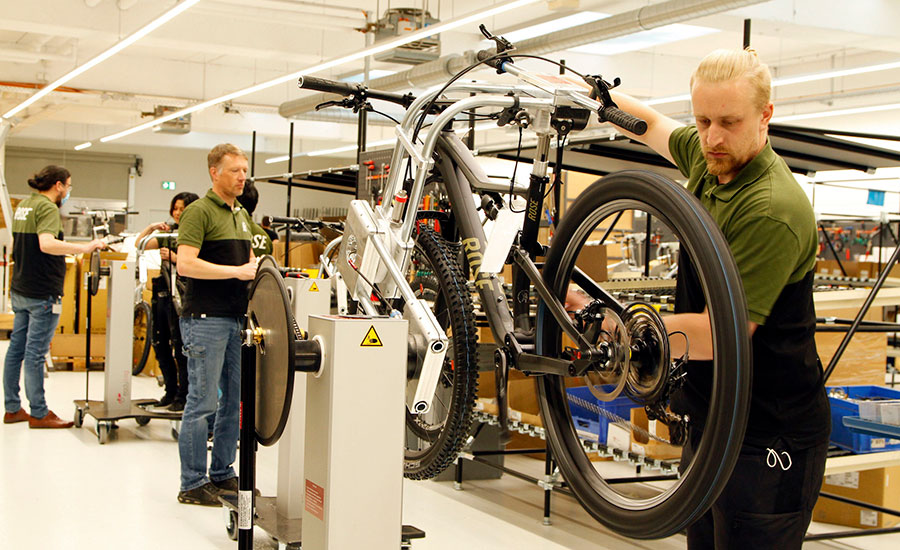
Flexibility is important at Rose Bikes, which produces some 120 bike models at its factory in Bocholt, Germany. Photo courtesy Roemheld GmbH
Evolving Assembly
Working at Rose was not always as comfortable as it is today. “More than 15 years ago, we used to hang the bikes from the ceiling with a hook for assembly,” recalls Strauss.
The production manager then developed an assembly cart himself. But, his shop-built cart had various disadvantages. “First, only the height of the workpiece was adjustable,” admits Strauss. “In addition, the cart was somewhat unstable, and bicycles sometimes fell off. And, the bicycles were clamped with the front wheel hub, which was not always gentle on the material.”
Around 2019, the operational limits of the shop-made carts became increasingly apparent. Bicycles weighing 30 kilograms or more needed to be easy to reach in any position without straining the back. This was not possible with the shop-made carts.
Also, the design of the front wheel hubs became more and more diverse. Therefore, some bikes could only be attached to the shop-made carts with great effort. When Rose began to build models with a hub that was closed on one side and could not be fixed, it was clear that a replacement was urgently required.
The successor would have to be suitable for all model types and all hub variants. Moreover, it should be just as easy to operate with heavy bikes as with light versions. Also, all assembly work and positions should be easily accessible. Lastly, the operation should be just as simple at the beginning of the assembly, when the bikes are still light, as at the end, when they have reached their final weight.
“At first, I wanted to develop an assembly aid myself again. My idea was a device where all bike models are held over the frame. But unfortunately, I was so busy that I never had enough time for this,” admits Strauss.
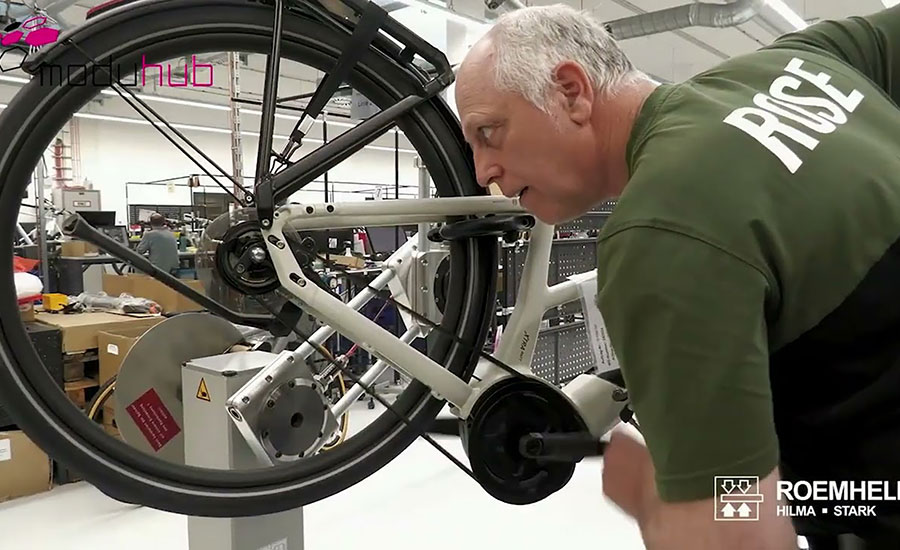
Variable load compensation can be adjusted to suit the assembly progress and bike weight. Photo courtesy Roemheld GmbH
Then, in 2020, while visiting the Motek trade fair for production and assembly automation in Germany, Strauss saw a work-positioning device at the Roemheld booth.
“The model was a bit too massive, heavy, inflexible and expensive, but it seemed to be expandable,” Strauss recalls.
As a result, Rose and Roemheld agreed on a development partnership. The Bike Promobil was born.
During the project, the heavy and expensive assembly stand, which was originally planned for automobile production, became a slim, flexible and lightweight cart—“at an attractive and competitive price,” Strauss points out.
Instead of being clamped over the frame, the bike is clamped over a dummy in the seat tube. For different diameters, assemblers use adapter sleeves that only have to be pushed into the tube. This simple and elegant solution is universally applicable. “By using a clamping adapter with an internal groove, we can clamp seat tubes with a battery cable or a cable for lowering the seat post without any problems,” says Strauss.
“Our mechanics are very satisfied with the Roemheld assembly cart,” he adds.
At first, some employees were unsure how to use the new carts. The multitude of adjustment options was initially a little overwhelming. But, after trying it out and getting used to it, the sceptics were entirely convinced. “Now, everyone wants a Bike Promobil device,” says Strauss.
For more information on work-positioning devices, visit https://roemheld-usa.com.
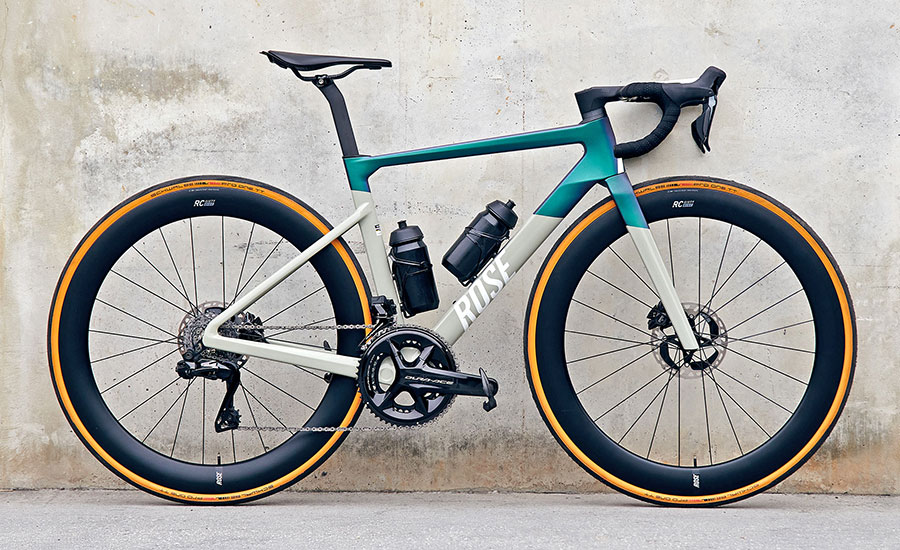
Rose’s products range from simple mountain bikes for just under 800 euros to high-end road bikes with carbon frames costing more than 8,000 euros. Photo courtesy Roemheld GmbH
ASSEMBLY ONLINE
For more information on work-holding and work-positioning devices, read these articles:
Positioning Equipment Improves Ergonomics for Medical Device Assembler
Lift and Positioning Assemblies
Hold It: What's New with Clamping and Workholding Technology


